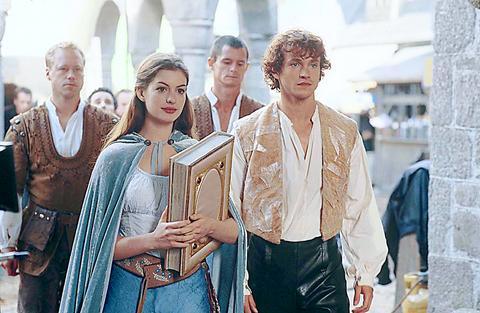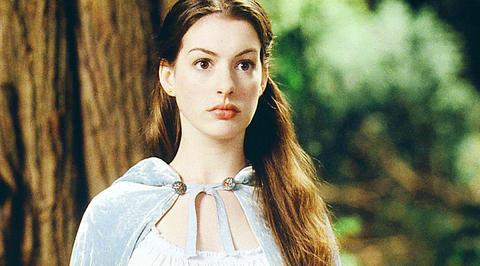Ella Enchanted, a funny takeoff on the ancient conventions of fairy tales, might be thought of as a live-action version of Shrek, the computer-animated hit of 2001 that blended a Brothers Grimm setting with characters and values drawn from contemporary shopping-mall culture. But as directed with verve by Tommy O'Haver (Billy's Hollywood Screen Kiss), Ella Enchanted is already so heavy with computer-generated effects that calling it live-action is to stretch the point.
Unquestionably live is Anne Hathaway, the 21-year-old actress who starred in The Princess
Diaries in 2001 (and is due back in August in the sequel, Princess Diaries 2: Royal Engagement).

PHOTO COURTESY OF MIRAMAX
Hathaway is an appealingly gangly, dark-eyed beauty with a streak of natural vivacity that recalls 1940s actresses like Ann Sheridan and Linda Darnell.
In Ella, which opens today, she plays the title character, a put-upon teenager in a storybook world. Her widowed father (Patrick Bergin) has injudiciously married Dame Olga (Joanna Lumley, of Absolutely Fabulous), the mother of all wicked stepmothers. She comes complete with a pair of entertainingly hateful daughters (Lucy Punch and Jennifer Higham), who like nothing better than torturing Ella, particularly once they discover that, thanks to a questionable gift bestowed by a fairy (Vivica Fox), she is unable to refuse any order she is given, from patting her head and rubbing her stomach to handing over the precious necklace that was her mother's gift to her.
The wicked stepsisters are obsessed with the hunky Prince Charmont (Hugh Dancy), heir apparent to the throne occupied by his evil uncle, Prince Regent Edgar (Cary Elwes, providing a link to another fairy-tale spoof, The Princess Bride of 1987, in which he starred). But Prince Char, as he is known to readers of Medieval Teen magazine, only has eyes for Ella from the moment their paths fortuitously cross.

PHOTO COURTESY OF MIRAMAX
As Ella sets out to find the errant fairy and convince her to revoke her dubious present, the screenwriters -- Laurie Craig, Karen McCullah Lutz, Kirsten Smith, Jennifer Heath and Michele Wolff (working from a novel by Gail Carson Levine) -- take her through various effects-filled realms, including a land where elves are forced by the evil regent to sing, dance and be relentlessly merry, and a forced-labor compound for giants that looks disturbingly like a concentration camp.
O'Haver gives the political subtext a forceful treatment but does not pat himself on the back for it. The messages blend seamlessly into the fantasy and comedy in what is surely one of the best films for older children in quite some time.

In the next few months tough decisions will need to be made by the Taiwan People’s Party (TPP) and their pan-blue allies in the Chinese Nationalist Party (KMT). It will reveal just how real their alliance is with actual power at stake. Party founder Ko Wen-je (柯文哲) faced these tough questions, which we explored in part one of this series, “Ko Wen-je, the KMT’s prickly ally,” (Aug. 16, page 12). Ko was open to cooperation, but on his terms. He openly fretted about being “swallowed up” by the KMT, and was keenly aware of the experience of the People’s First Party

Aug. 25 to Aug. 31 Although Mr. Lin (林) had been married to his Japanese wife for a decade, their union was never legally recognized — and even their daughter was officially deemed illegitimate. During the first half of Japanese rule in Taiwan, only marriages between Japanese men and Taiwanese women were valid, unless the Taiwanese husband formally joined a Japanese household. In 1920, Lin took his frustrations directly to the Ministry of Home Affairs: “Since Japan took possession of Taiwan, we have obeyed the government’s directives and committed ourselves to breaking old Qing-era customs. Yet ... our marriages remain unrecognized,

During the Metal Ages, prior to the arrival of the Dutch and Chinese, a great shift took place in indigenous material culture. Glass and agate beads, introduced after 400BC, completely replaced Taiwanese nephrite (jade) as the ornamental materials of choice, anthropologist Liu Jiun-Yu (劉俊昱) of the University of Washington wrote in a 2023 article. He added of the island’s modern indigenous peoples: “They are the descendants of prehistoric Formosans but have no nephrite-using cultures.” Moderns squint at that dynamic era of trade and cultural change through the mutually supporting lenses of later settler-colonialism and imperial power, which treated the indigenous as

Standing on top of a small mountain, Kim Seung-ho gazes out over an expanse of paddy fields glowing in their autumn gold, the ripening grains swaying gently in the wind. In the distance, North Korea stretches beyond the horizon. “It’s so peaceful,” says the director of the DMZ Ecology Research Institute. “Over there, it used to be an artillery range, but since they stopped firing, the nature has become so beautiful.” The land before him is the demilitarized zone, or DMZ, a strip of land that runs across the Korean peninsula, dividing North and South Korea roughly along the 38th parallel north. This